12 Personal Devices and Technology Impacting Students Learning Abilities
Anna Costas
12.1 Introduction
Keywords
- Distraction – a thing that prevents someone from giving full attention to something else.
- Academic performance – the measurement of student achievement across various academic subjects
- Multitasking – the performance of more than one task at the same time.
- Proximity – nearness in space, time, or relationship
Learning Objectives
By the end of this chapter, students should be able to:
- Discuss the changes in technology over the years and how it has affected students.
- Understand why phones, iPads, laptops, and other technologies/personal devices are distractions.
- Academic performance is lower for students who use personal devices in class than those who do not use them.
- The use of technology can be distracting to those who don’t actually use it in class and at home.
- Discuss the future for students’ learning abilities and academic performance with personal devices and technology.
In today’s day and time, cellphones, iPads, computers, and other technological devices are used by almost everyone, even in classrooms. These devices have become a staple for most people, especially students and teenagers. Schools provide computers and iPads for students to do their work more efficiently, but is it that efficient? In some ways, yes, but what will be discussed in this chapter is its negative effects. Not just the computers have negative effects; personal devices do as well. The most significant impact is that academic performance, which measures student achievement across various academic subjects, is lower for students because of the distractions that prevent students from giving their full attention to these technological devices.
The use of personal devices and technologies has negatively impacted students’ learning abilities and academic performance while becoming a distraction for themselves and others around them. Students are constantly on their phones and not paying attention in class. They are also not using their computers the way they are supposed to, like taking notes or doing assignments. Students are no longer learning like they used to because of these distractions. They are also having a more challenging time learning because of the ability to look things up just to finish assignments instead of trying to learn and figure it out.
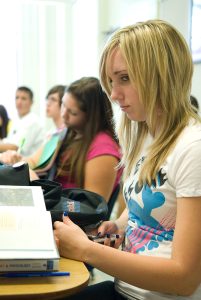
“Sneaky Messages” by Tommy Huynh is licensed under CC BY-NC-ND 2.0
12.2 – Technology in the Classroom Over Time
Key Takeaway
Learning in the past was much different than what it is today. Learning was based on books and lectures, but in present times everything is on computers, the internet, and websites. Students would sit through lectures and have nothing else to do but take notes and pay attention. Notes were also taken by hand because there was no other way to take them like there are today. Assignments were also given on paper. People also had to go to libraries to look through books and encyclopedias for research. Then the creation of desktop computers became a great source of information and was put into libraries and computer labs. Even with these developments, students would still have to go to either of those places to research information. The computers ran slower and did not have all of the applications and programs that are on them now. As newer desktop computers were made, they were implemented into those same places. Still, they ran faster and had more advanced applications and software because of technological progression, which made them better than before. Now, schools give students laptops and iPads and have desktop computers in libraries and computer labs.

“Hellenic American School, Lowell, Massachusetts documentary photographs” is in the Public Domain
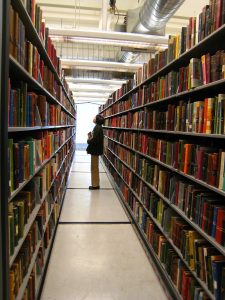
“Minneapolis Public Library-2007-02-20.jpg” by steve lyon is licensed under CC BY-SA 2.0
With students having personal devices and other technological devices being supplied by schools, they have become much more distracted. The way they learn is also being affected as a result. In the past, because students had to actively look for the information in books and libraries, they were actually learning and retaining it. Now, students will just look answers up online to find the answers instead of learning the information they need. With textbooks now being online and a lot of the work being assigned online, computers and or other forms of technology are used instead of paper. Students are also having a more challenging time focusing in class and on assignments because they are distracted by their cell phones. They are also distracted by things besides schoolwork on their computers. Because of this, the academic performance of these distracted students is at risk and significantly lower than those who do not use those devices in classrooms and while studying. In the past, students were not at this risk. They did not have as many distractions as students do now. Things like studying and finishing assignments were done much quicker because they weren’t constantly distracted by looking at a phone, tv, or computer.
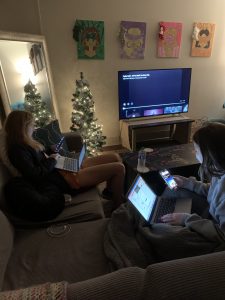
Photo Taken by Anna Costas
12.3 – The Impact of Personal Devices and Technology on Students
Key Takeaway
12.3.1 What Students are Doing in Class
In today’s society, laptops, cellphones, iPads, and other devices are used all the time and carried around by people, especially students. Phones are being taken with people and students everywhere they go, even if it is to class when they are supposed to be paying attention. While teachers are giving a lesson, students are supposed to be attentive and take notes. Meanwhile, they are not paying attention because they are on their phones or doing something else on their computers or iPads. Some students pay attention, take notes, and won’t take out their phones or go on their computers to do something they aren’t supposed to do. But if you were to go into a classroom and look around, you would see most of the students on their phones or doing something unrelated to class on their computers or iPads. They probably aren’t taking notes, or if they do, it is on the computer or iPad. When notes are not taken by hand, information is not retained as easily, and there is more of a chance of forgetting the information. That is why some teachers recommend taking notes by hand but do not require it. Nowadays, students are not paying attention in class because of their personal devices and technology, causing a distraction.
12.3.2 The Effect on Students
When students are on their phones, computers, or iPads, they are not only distracting themselves, they are distracting others around them. When you are in close proximity, which in this case is being near technology, you tend to be drawn to it, being distracted from what you are actually supposed to be doing. If a student didn’t bring a laptop to class or take out one of his devices, other students’ screens would cause a distraction. These devices are being used in ways they aren’t supposed to, which is affecting others too. Teachers may also never know what students are doing behind or on their computers. They can’t really control what the students do unless discipline is involved. These distractions have a negative effect on students’ academic performance and ability to learn.

“Phone Distracting Student from School Work” by Artur Verkhovetskiy is under a Depositphotos Royalty Free License
The use of personal devices and technologies causes disadvantages in classrooms. Students who use their phones, iPads, and computers in class make their academic performance worse. If students do not go on their phones in class, they are more likely to learn the information and perform better in class. They will have better grades. Outside of the classroom, when students are doing assignments or studying, they will stop and check their phones multiple times. They think they can also watch tv or do other things on their devices while doing school work but multitasking, which is doing various things at once, makes it much harder to focus. Because they are spending time on these devices, it takes them much longer to do their work. It also takes much longer for studying while it also reduces the likelihood of remembering the information. The results of this could be a lower grade on the assignment or a quiz/test. A lower GPA and academic performance can be caused by social media usage, texting, playing games, etc. Those are some things that students will do on their personal devices and technologies that have negatively impacted students’ learning abilities and academic performance.
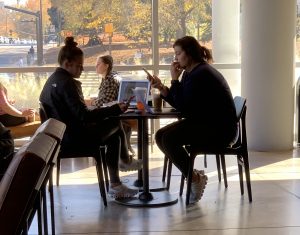
Photo Taken by Anna Costas
Cast Study: Quiz Average With and Without Technology
A study was done by an assistant professor at the University of Alabama on the presence of cell phones in classrooms of college students. It would help him, and the world understand the impact of phones on students’ learning abilities. The experiment was conducted with 381 college students. They were to sit in a classroom, watch a 20 minute TED talk video called “A Radical Experiment in Empathy,” and then take a short quiz afterward. Some students were not allowed to bring their phones into the classroom at all. Others were told they were allowed to bring them in but to put them in silent mode and not use it. The rest were told that they were allowed to use their phones.
Students performed worse on a quiz when given the ability to go on their phones. The students who were not allowed got a higher grade. The ones that were allowed to have their phones distracted were the ones around them that could not. The use of the devices distracted others which caused lower academic performance for them as well. The only issue with this experiment was that it did not occur in real classrooms where grades were at risk. So some of the students were ok with performing poorly. Others might have paid a little bit more attention if it was truly for a grade. The other issue was that most lectures are longer than 20 minutes. (Dolan, 2018).
Key Takeaway
In the future, students will have a more difficult time focusing on school than students are today. This could be because of technology becoming much more prominent in schools and their lives than today. That’s hard to believe, but it is probably true. When you look at the past, they didn’t have the technology in our lives today, and they probably thought, “how could things become more advanced?”. Well, it did advance, and it will continue to. There might be new technologies and devices that students will also become more distracted by. Because it is advancing, it will be used way more than it is today. Kids nowadays rely on technology so much that they can’t live without it. If you take an iPad away from a child, it will cry and throw a fit because they depend on it to make them happy. The kids growing up like that will depend on it more than we do today and will become more distracted by it. They will become much more distracted than students are today because I think technology will be used much more than what it is today. Classes could even be fully online like it was when COVID started. There will probably be nothing given on paper, and notes will be taken all online, as it is now. Academic performance and learning abilities will be negatively affected because distractions will be like they are now or even worse.
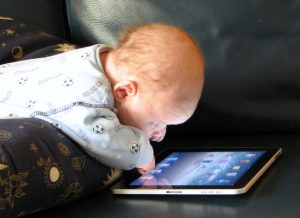
“Baby Sees The iPad Magic” by Steve Paine is licensed under CC BY-ND 2.0
Chapter summary
Personal devices and technologies negatively impact students’ learning abilities and academic performance. This was not the case for learning in the past. Students would not have these devices to distract them in class and while doing work and studying outside of the classroom. If they had low academic performance, it was just because of not putting in effort or not understanding the material. Nowadays, phones, iPads, and computers have become huge distractions. These devices will be misused while in class, which causes them not to pay attention and do the work they are supposed to do. It also causes a distraction when doing assignments at home and while studying. It takes much longer to finish the assignment and study because of them. All of this leads to a lower GPA and academic performance, which proves that personal devices and technology negatively affect students. It will be worse for students in the future because their lives will be based more on technology than today. They would have grown up using technology and will continue to use it in ways that they aren’t supposed to. Because of this, academic performance will still be lower than it would be without technology.
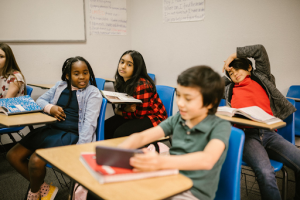
“Cell Phones Distracting Students” by Rodnae Productions licensed under a Pexels license
Review Questions
1. Academic performance is ________ than what it used to be because of technology?
A. Higher
B. Lower
C. The same
2. Why is information not being retained by students?
A. They use their phones while studying
B. They look answers up online
C. They don’t take handwritten notes
D. All of the above
3. What does multitasking while doing schoolwork do?
A. It makes it harder to focus
B. Gets work done faster
C. Gets work done slower
D. Both A and C
4. In the future, will students have a more challenging time focusing on schoolwork because of the advancement in technology?
A. True
B. False
Answers:
- B
- D
- Both A and C
- A
Food for Thought
- Do you think that your grades would be better if you did not have a cell phone or computer?
- Would you learn better if we did everything with pencil and paper, like in the past?
- Think about how things have changed since you first started going to school. What was learning like for you in elementary school, how is it now, and which way do you prefer?
- What do you think learning will be like in the future with the use of these technologies?
References
Buccino, N. (2018, July 27). Cellphone distraction in the classroom can lead to lower grades, Rutgers Study finds. Rutgers University. Retrieved November 4, 2021, from https://www.rutgers.edu/news/cellphone-distraction-classroom-can-lead-lower-grades-rutgers-study-finds.
Dolan, E. (2018, May 15). Just having your cell phone in your possession can impair your learning, study suggests. PsyPost. Retrieved November 4, 2021, from https://www.psypost.org/2018/05/just-cell-phone-possession-can-impair-learning-study-suggests-51228.
Dontre, A. J. (2020, November 23). The influence of technology on academic distraction: A Review. Wiley Online Library. Retrieved November 4, 2021, from https://onlinelibrary.wiley.com/doi/full/10.1002/hbe2.229.
Ehmke, R. (2021, October 12). How phones ruin concentration. Child Mind Institute. Retrieved November 9, 2021, from https://childmind.org/article/kids-shouldnt-use-phones-during-homework/.
Goundar, S. (2014, September 24). The distraction of technology in the classroom. Journal of Education & Human Development. Retrieved November 4, 2021, from https://www.academia.edu/8478150/The_Distraction_of_Technology_in_the_Classroom?auto=citations&from=cover_page.
Ravizza , S. (2019, October 31). It’s true, internet surfing during class is not so good for grades. Retrieved November 8, 2021, from https://theconversation.com/its-true-internet-surfing-during-class-is-not-so-good-for-grades-70901.
Technology and student distraction. Derek Bok Center, Harvard University. (n.d.). Retrieved November 4, 2021, from https://bokcenter.harvard.edu/technology-and-student-distraction.
Uzun, A. M., & Kilis, S. (2018, September 7). Does persistent involvement in media and technology lead to Lower Academic Performance? evaluating media and technology use in relation to multitasking, self-regulation and academic
The measurement of student achievement across various academic subjects.
A thing that prevents someone from giving full attention to something else.
Nearness in space, time, or relationship.
The performance of more than one task at the same time.

